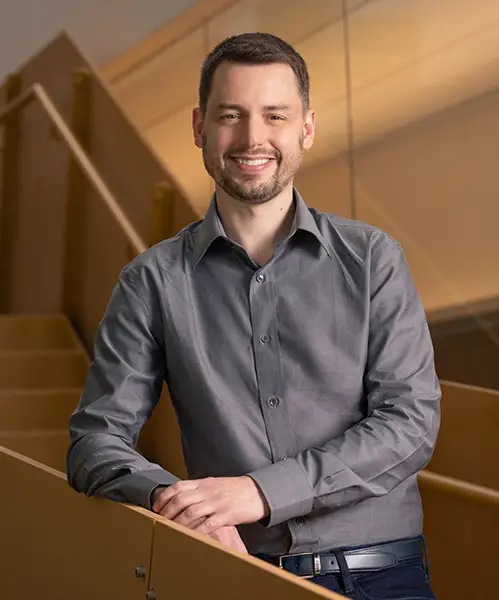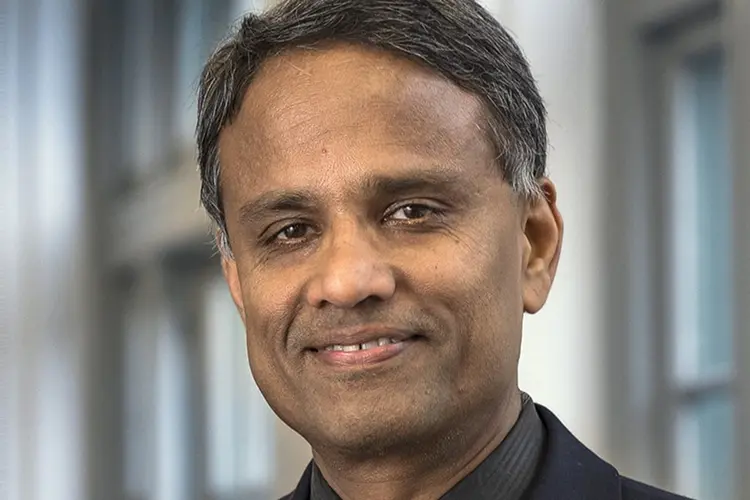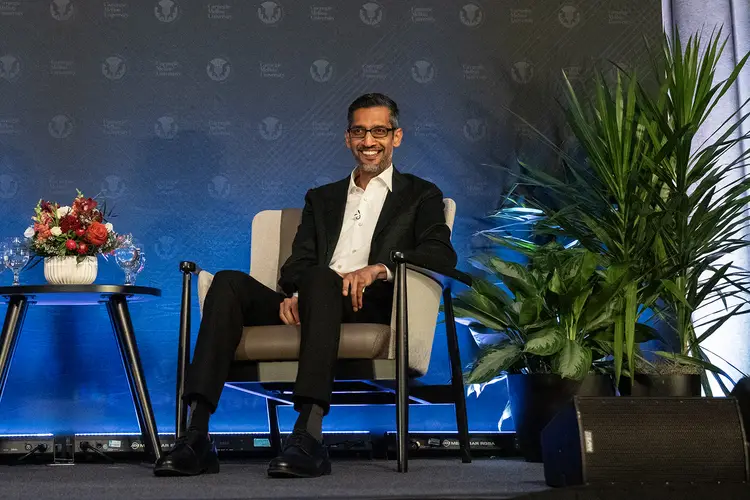
Pittsburgh’s AI-Powered Renaissance
CMU experts explain why Pittsburgh is poised to lead the industrial revolution in human-first AI
Media Inquiries
Carnegie Mellon University’s artificial intelligence experts come from a wide range of backgrounds and perspectives, representing fields including computer science, sustainability, national security and entrepreneurship.
Ahead of next week’s AI Horizons Summit(opens in new window) highlighting the city's commitment to responsible technology, CMU experts weighed in on why they see Pittsburgh as a hub for human-centered AI.
A confluence of technology and humanity
It’s an exciting time to be in Pittsburgh. Artificial intelligence has emerged as the single most significant intellectual development of our time. It is rapidly impacting every sector of our economy — from health care and manufacturing to finance and transportation — and unlocking unprecedented levels of innovation, collaboration and transformation across our society. The opportunity, which requires a critical confluence of technology and humanity, is one that’s tailor-made for Western Pennsylvania’s robust robotics and AI ecosystem.
— Farnam Jahanian(opens in new window)
President
Henry L. Hillman President's Chair
Reclaiming the epicenter of entrepreneurship
Pittsburgh’s long-standing legacy in robotics and AI research, particularly through institutions like CMU, has made the city a global leader in human-centric AI innovation. What sets Pittsburgh apart is its commitment to advancing AI technology in a way that addresses real human needs across industries. As we explore how AI can democratize entrepreneurship and transform the venture capital landscape, we must recognize the significant opportunity at hand during this AI revolution — an opportunity for Pittsburgh to reclaim its role as the nation's epicenter of entrepreneurship and startup investment, much like it was during the industrial revolution.
— Meredith Meyer Grelli(opens in new window)
Assistant Dean of Entrepreneurship Initiatives, School of Computer Science
Director, Project Olympus
Entrepreneur in Residence, Swartz Center for Entrepreneurship
Assistant Professor of Entrepreneurship, Tepper School of Business
Financial services need human-centric AI
In my experiences interacting with banks, including BNY's AI Hub in Pittsburgh, I have been struck by a few things: Financial institutions are swimming in data; they could greatly benefit from streamlined data-driven decision-making processes; they are highly regulated — and for good reason — and thus cannot easily rely on fully autonomous AI systems for decision-making purposes. Hence, financial services are a natural vertical to focus on in the context of human-centric AI.
CMU has an unparalleled degree of expertise in AI among its faculty and students. In the context of human-centric AI, the fact that we have distinct departments in machine learning, human-computer interaction, and language technologies, coupled with a highly collaborative research environment, gives CMU and Pittsburgh a technical advantage. We have a burgeoning startup scene, in part based on academic spinouts, including two of the fastest growing AI startups in the world: Abridge AI and Skild AI.
— Ameet Talwalkar(opens in new window)
Associate Professor
School of Computer Science
AI to solve real world problems in health care
There is tremendous excitement about the new generation of AI tools and nowhere could their impact be greater than in improving human health. AI tools seem to hold great promise for personalized medicine but also warrant caution as we see what they do not do well and how much we do not yet understand about how they work and how they might be improved. The big leaps in AI we are seeing now are neither the beginning nor the end of the field. They were built on a foundation of decades of research into AI fundamentals and their application to real-world problems in human health and disease, areas in which Pittsburgh researchers have long been world leaders. And there is much more to be done to fully realize their potential.
Now we begin the real work of solving the remaining hard problems to make the new AI an effective, trustworthy and equitable tool for solving real-world problems in challenging domains like human health. The foundation of expertise we have built here in Pittsburgh in fundamental AI and in how to bring it to practical problems in human health, our collaborative and interdisciplinary culture, and the educational systems they have produced, are what is needed now to realize the full promise of AI. For anyone who wants to do serious work in bringing AI to solve practical human-centric problems, I believe there is no better place to be right now than Pittsburgh.
— Russell Schwartz(opens in new window)
Professor and Head of the Ray and Stephanie Lane Computational Biology Department
School of Computer Science
Pittsburgh as a guardian of security in the digital age
Pittsburgh's commitment to AI stems from its unique combination of academic, industrial and governmental partnerships, making it a hub for human-centric AI development. Home to Carnegie Mellon University, a world leader in AI research, Pittsburgh has fostered cutting-edge innovations that prioritize ethical considerations, transparency and security. From a national security perspective, the city's focus on AI helps safeguard critical infrastructure, enhances cybersecurity, and supports military and intelligence advancements worldwide. Its collaborative ecosystem — bolstered by tech giants, AI startups, and robust educational infrastructure — positions Pittsburgh as a leader in responsible AI, ensuring it remains both a global innovator and a guardian of security in the digital age.
— Michael Mattarock, II(opens in new window)
Executive Director, National Security Research
AI to drive manufacturing forward
We are in an era where we are seeing the maturity of capabilities for manufacturers that are working together to create technology not possible even five years ago. AI is the most important attribute of these new capabilities. Here in Pittsburgh, where we are headquartered, the ARM Institute collaborates with Carnegie Mellon University’s Manufacturing Futures Institute(opens in new window) (MFI) to advance the deployment of AI solutions in robotics for manufacturers, particularly those companies that have no ability to deploy these advanced capabilities on their own. The AI Learning Lab, a three-way collaboration between the ARM Institute, MFI and Catalyst Connection, will expose operations workers and managers to AI in robotics, leveraging the technology of both the ARM Institute and Carnegie Mellon University at Mill 19(opens in new window) in Hazelwood Green. Taking the critically needed two-fold approach to not only develop AI as a technical tool, but also prepare the workforce to leverage AI, we will be working with CMU and the rest of the ARM Institute’s 400-plus member organization consortium to train autonomous and semi-autonomous industrial robots to do AI-enabled tasks that have been difficult, dangerous or even impossible for humans to do in the past.
Pittsburgh is well-positioned to drive AI forward within manufacturing. The collaborative nature of organizations in the region combined with the wealth of technical expertise makes the region uniquely positioned to drive towards a future that is directed by humans and assisted by advanced technologies like AI and robotics. Through these kinds of AI-empowered technologies, the ARM Institute and its consortium will be leading the way right here in Pittsburgh to a future where people and robots work together to respond to our nation’s greatest challenges and to develop and produce the world’s most desired products.
— Ira Moskowitz(opens in new window)
CEO, The ARM Institute
Lasting contributions from Pittsburgh
Pittsburgh has positioned itself as a worldwide leader in AI, led of course by Carnegie Mellon's long-time leadership and dedication to the field. Starting with Allen Newell and Herb Simon's inspiration and initiative, to the founding of departments dedicated to AI like the Machine Learning Department and Robotics Institute, and continued with today's influence on Generative AI and creation of AI startups, CMU has been a driving force in AI since the field's inception. With the recent continued expansion and public awareness of AI, in addition to continually welcoming numerous AI focused businesses, startups and research facilities to the city, Pittsburgh itself is well-positioned to capitalize on our lasting contributions.
— Zico Kolter(opens in new window)
Associate Professor and Department Head, Machine Learning Department
School of Computer Science
Turbocharging clean energy innovation
Pittsburgh brings the past, present, and future together in exciting ways, especially at the intersecting frontiers of AI and energy. Our energy and manufacturing capabilities, brought together with our deep strengths in AI and computing at our universities and in our emerging entrepreneurial ecosystems, turbocharge the region's ability to lead in clean energy innovation, to the benefit of our workers, communities, and the nation. CMU’s Scott Institute for Energy Innovation and Engineering and Public Policy Department are proudly engaged in campus and community-wide collaboration to realize this ambitious vision.
— Valerie Karplus(opens in new window)
Professor, Engineering and Public Policy
Courtesy Appointment, Heinz College
Associate Director, Scott Institute for Energy Innovation










